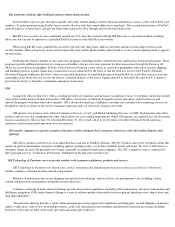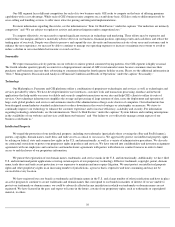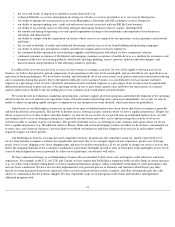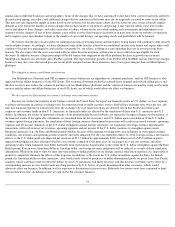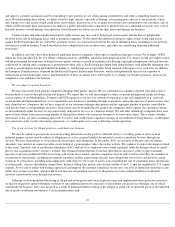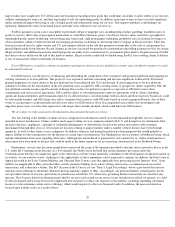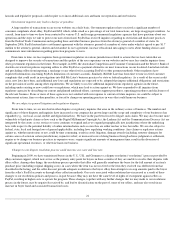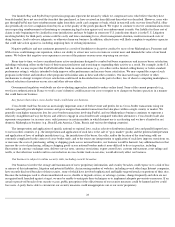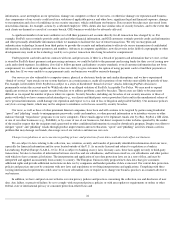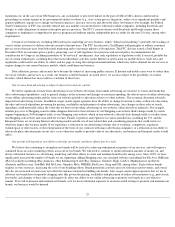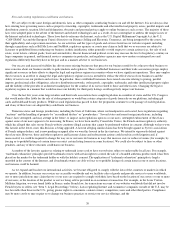eBay 2011 Annual Report Download - page 21
Download and view the complete annual report
Please find page 21 of the 2011 eBay annual report below. You can navigate through the pages in the report by either clicking on the pages listed below, or by using the keyword search tool below to find specific information within the annual report.
In Australia, PayPal serves its customers through PayPal Australia Pty. Ltd., which is licensed by the Australian Prudential Regulatory
Authority as a purchased payment facility provider, which is a type of authorized depository institution. Accordingly, PayPal Australia is subject
to significant fines or other enforcement action if it violates the disclosure, reporting, anti-money laundering, capitalization, corporate governance
or other requirements imposed on Australian depository institutions. In China, PayPal is affiliated with Shanghai Wangfuyi Information
Technology Ltd., which is licensed as an Internet Content Provider and operates a payments service only for Chinese customers and only for
transactions denominated in Chinese currency. The People's Bank of China (PBOC) has recently enacted regulations to establish a new type of
license, called a Payment Settlement Organization (PSO) license, which will be required for non-bank payment services. The PBOC regulations
leave unclear whether a foreign-owned company such as PayPal can control or invest in a Payment Settlement Organization, and whether
Wangfuyi or PayPal's wholly-owned subsidiary in China would be eligible to obtain a PSO license.
To date, PayPal has obtained licenses to operate as a money transmitter in 42 U.S. states, the District of Columbia and Puerto Rico. PayPal is
also licensed as an escrow agent in one U.S. state. PayPal is applying for money transmitter licenses in five additional states to facilitate its
planned offering of payment services at the retail point of sale. The two remaining U.S. states do not currently regulate money transmitters. As a
licensed money transmitter, PayPal is subject to restrictions on its investment of customer funds, reporting requirements, bonding requirements,
and inspection by state regulatory agencies. If PayPal were found to be in violation of money services laws or regulations, PayPal could be subject
to liability and/or additional restrictions (e.g., liquidity requirements), forced to cease doing business with residents of certain states, forced to
change its business practices, or required to obtain additional licenses or regulatory approvals that could impose a substantial cost on PayPal. Any
change to PayPal's business practices that makes the service less attractive to customers or prohibits its use by residents of a particular jurisdiction
could also decrease the velocity of trade on eBay and websites operated by GSI's clients that accept PayPal as a form of payment, which would
further harm our business. PayPal's California regulator, the California Department of Financial Institutions (DFI), recently notified PayPal that
PayPal's current practice of holding the funds underlying U.S. customer balances as an agent on behalf of its customers, rather than as owner of
those funds, causes PayPal to be in violation of the liquidity rules applicable to California money transmitter licensees. PayPal has established this
current practice in part to maintain potential eligibility of those funds for pass-through Federal Deposit Insurance Corporation (FDIC) insurance
coverage when those funds are placed in U.S. bank accounts. PayPal has requested the DFI to grant a waiver that would allow PayPal to continue
to hold those funds as an agent or custodian on behalf of customers and still qualify those funds as liquid assets. If a waiver is not granted, PayPal
would have to change these arrangements to hold the funds directly. This would likely disqualify the funds from pass-through FDIC insurance,
and could also result in decreased revenue to PayPal if it decides to shift the funds from bank accounts to securities that bear lower interest rates.
Any potential decrease in revenue to PayPal resulting from this change is not expected to be material. This would also result in these funds, which
are currently not reported as assets owned by PayPal on our consolidated balance sheet, moving onto our consolidated balance sheet (along with
the accompanying liabilities). For additional information, please see “Item 7: Management's Discussion and Analysis of Financial Condition and
Results of Operations” under the caption “Off-Balance Sheet Arrangements.” As of December 31, 2011, these funds totaled approximately $2.7
billion.
In markets other than the U.S., the EU, Australia, the China domestic business and Brazil, PayPal serves its customers through PayPal
Private Ltd., a wholly-owned subsidiary of PayPal that is based in Singapore. PayPal Private Ltd. is regulated in Singapore as a stored value
issuer. In many of these markets, it is not clear whether PayPal's Singapore-based service is subject only to Singaporean law or, if it were subject
to local laws, whether such local law would require a payment processor like PayPal to be licensed as a bank or financial institution or otherwise.
In such markets, the business may rely on partnerships with local banks to process payments and conduct foreign exchange in local currency.
Local regulators who do not have direct jurisdiction over Singapore-
based PayPal Private Ltd. may use their local regulatory power to slow or halt
payments to local merchants conducted through the local banking partner. Such regulatory actions impacting local banking partner arrangements
could impose substantial costs and involve considerable delay to the provision or development of PayPal services in that market, or could prevent
PayPal from providing any services in a given market. The Reserve Bank of India has asserted that PayPal's offering of payment services to
customers outside of India to send personal, non-commercial payments to recipients in India requires a license from the Reserve Bank. For a
period of time in 2010, the Reserve Bank directed the Indian affiliate of PayPal's processing bank to suspend withdrawals to the Indian bank
accounts of PayPal customers for both personal and business customers. PayPal has ended personal non-commercial payments to and from Indian
accounts and the ability of Indian sellers to spend payments they receive, and has also stopped offering certain commercial payments between
Indian buyers and Indian sellers. In November 2010, the Reserve Bank of India issued guidelines to Indian banks on the requirements for
processing export-related transactions for online payment gateway service providers such as PayPal, including a limitation on the amount of
individual transactions to no more than $500 (increased in October 2011 to $3,000). The Reserve Bank may again impose a suspension if it is not
satisfied with PayPal's and its partner bank's actions to comply with these guidelines. In the event of any non-compliance, PayPal could be subject
to fines from the Reserve Bank, and PayPal's prospects for future business in India, both cross-border and domestic, could be materially and
adversely affected.
16


